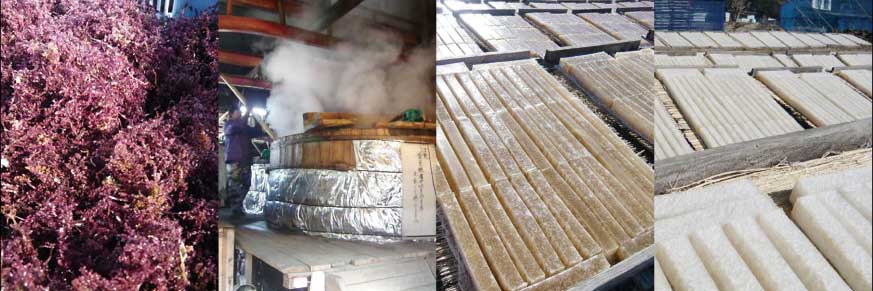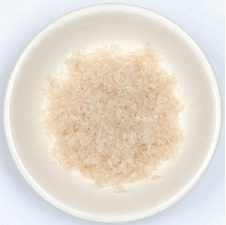
Mitoku’s traditional agar (also known as kanten) is made by cooking down red sea vegetables, then storing the extracted gelatin outdoors in the open air to reduce its moisture content. This time-consuming process is carried out in the inland mountains of Shinshu, Nagano, by a small family firm, founded in 1934 and currently run by its third generational owner.
Production takes place during the coldest months of the year from December through to mid-February. First, the sea vegetables are washed to remove salt, sand, and seashells, then placed in a large cauldron and cooked for several hours. This dissolves the solids, leaving behind the galactose gel that forms the supporting structure of the algae’s cellular walls. The gel is then left at room temperature to cool and solidify. At this point, the agar still retains 99% of its moisture.
Next, the agar is cut into blocks, arranged on wooden trays, and set outside in the fields, where it will alternately freeze during the night and thaw during the day. This process can only be carried out when nighttime temperatures are between -2°C and -13°C. The agar is left outdoors for two to four weeks until its moisture has almost completely evaporated, leaving behind a feathery light, crisp, flaky bar. These bars are either sold as they are or shredded into flakes.
Despite being far from the sea, the alpine climate of Nagano provides the perfect environment for agar production, with its cold winter nights, mild sunlit days, and beautiful, clear water and air. But although Nagano has long been a centre for agar production, the number of traditional producers has declined in recent years, and most manufacturers now employ modern methods, using chemical additives to speed up production.
By contrast, Mitoku’s agar flakes and bars are made using time-honored techniques and natural ingredients, resulting in an additive-free gelling agent that contains almost no calories, is rich in soluble dietary fibre, and has excellent texture, strength, and water-retentive properties.



